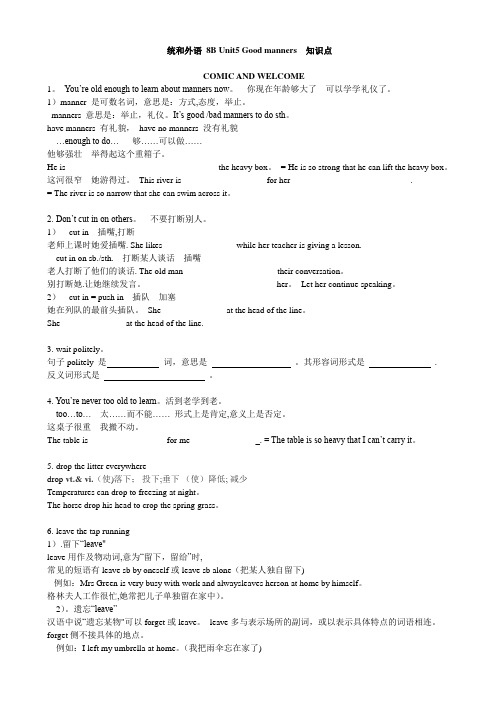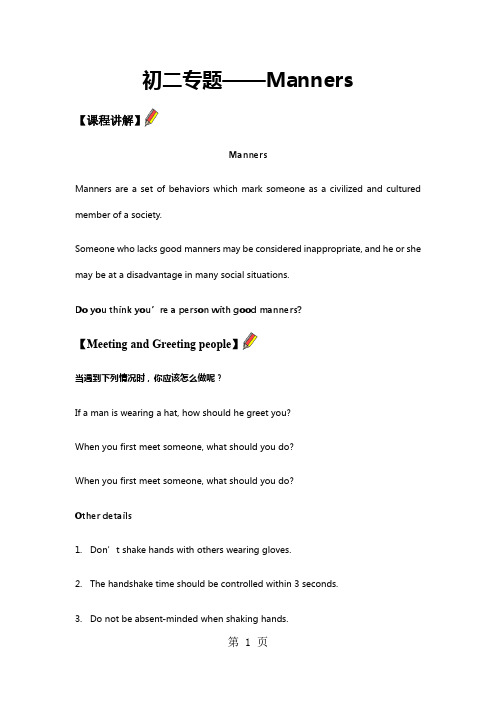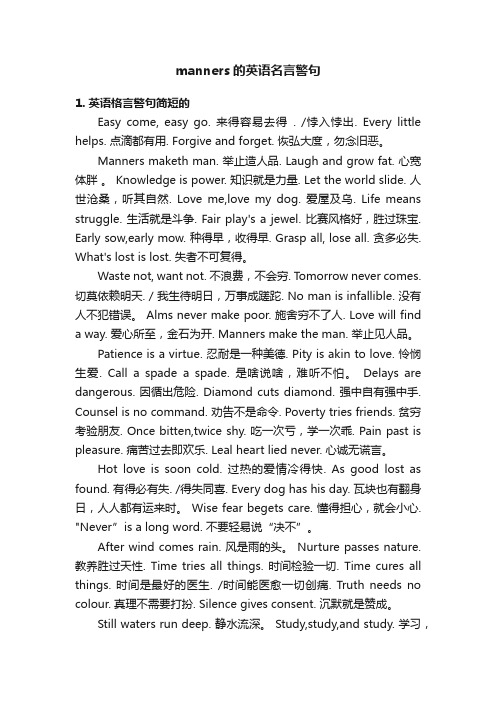Manners
8B-Unit5-Good-manners知识点讲解

统和外语8B Unit5 Good manners知识点COMIC AND WELCOME1。
You’re old enough to learn about manners now。
你现在年龄够大了可以学学礼仪了。
1)manner 是可数名词,意思是:方式,态度,举止。
manners 意思是:举止,礼仪。
It’s good /bad manners to do sth。
have manners 有礼貌,have no manners 没有礼貌…enough to do… 够……可以做……他够强壮举得起这个重箱子。
He is _________ _________ ______ _________the heavy box。
= He is so strong that he can lift the heavy box。
这河很窄她游得过。
This river is ________ __________ for her _______ _________ __________.= The river is so narrow that she can swim across it。
2. Don’t cut in on others。
不要打断别人。
1)cut in 插嘴,打断老师上课时她爱插嘴. She likes __________ ______while her teacher is giving a lesson.cut in on sb./sth. 打断某人谈话插嘴老人打断了他们的谈话. The old man ______ _______ _______their conversation。
别打断她.让她继续发言。
_______ _______ ______ _______ her。
Let her continue speaking。
2)cut in = push in 插队加塞她在列队的最前头插队。
manner和manners

Hale Waihona Puke 式”) ★实 战 演 练 :
I don't like his manner;it's very rude. 我不喜欢他的举止,太粗鲁了。 It's bad manners to point at people. 对人指指点点是很不礼貌的。 She spoke to us in an impolite manner. 她跟我们说话时很不礼貌。
请您及时更换请请请您正在使用的模版将于2周后被下线请您及时更换
manner和 manners
★manner和 manners本 属 同 一 个 单 词 , 只 不 过 后 者 为 前 者 的 复 数 形 式 , 究 其 差 别 , 简 介 如 下 : manner——表示做事的“方式、方法”或“举止、态度” manners——表示“风度、礼貌”或“风俗、生活方式” (注:manner在表示“方式、方法”时,多与介词in连用,形成短语“in a(n)… manner”表示“以……的方
英语常用同义词辨析

英语常用同义词辨析habit, custom, manners, usage, practice, convention, tradition这些名词均含有“习惯,风俗,传统”之意。
habit〓侧重于自然养成的,不易去掉的个人习惯。
custom〓指一个国家、一个民族、一个地区或一个社会的习惯、行为方式或风俗习惯。
也可指个人的习惯。
manners〓指在某一时期或某一团体中盛行的社会礼仪或社会风俗模式。
usage〓指持续时间长,为很多人公认采纳的惯例、习俗。
practice〓常指习惯性的做法或行为。
convention〓多指约定俗成的行为方式规则或公认的标准,或指艺术上公认的技巧。
tradition〓广义指世代相传的伦理、行为规范和生活方式,特指因长久奉行而几乎具有法律效力的习惯、习俗,侧重历史意义。
hang, suspend这两个动词均含“挂,吊”之意。
hang〓通常指一端固定于一点或一条线上,另一端悬于空中的状态。
suspend〓侧重悬挂物支撑点的灵活性和活动自由。
happen, occur, chance, take place这些词语都可表示“发生”之意。
happen〓普通用词,泛指一切客观事物或情况的发生,强调动作的偶然性。
occur〓较正式用词,可指意外地发生,也可指意料中的发生。
chance〓侧重事前无安排或无准备而发生的事,特指巧合。
take place〓多指通过人为安排的发生。
happy, glad, cheerful, joyful, merry, delightful, gay, pleasant, nice, jolly, agreeable这些形容词均含“愉快的,高兴的”之意。
happy〓侧重感到满足、幸福或高兴。
glad〓最普通用词,语气较弱,表示礼貌的惯用语。
指乐于做某事或因某事而感到满足,常表愉快的心情。
cheerful〓多指因内心的愉快而表现出兴高采烈,是强调而自然的感情流露。
初二专题 manners-精选教育文档

初二专题——Manners【课程讲解】MannersManners are a set of behaviors which mark someone as a civilized and cultured member of a society.Someone who lacks good manners may be considered inappropriate, and he or she may be at a disadvantage in many social situations.Do you think you’re a person with good manners?【Meeting and Greeting people】当遇到下列情况时,你应该怎么做呢?If a man is wearing a hat, how should he greet you?When you first meet someone, what should you do?When you first meet someone, what should you do?Other details1.Don’t shake hands with others wearing gloves.2.The handshake time should be controlled within 3 seconds.3.Do not be absent-minded when shaking hands.4.Smile to each other when shaking hands.5.The owner stretch out hands first to show welcome to the guest. 【Visiting manner】Conversation manner•Don’t ask any private things when talking to others.•There is something they avoid talking about .•Americans take personal space important.【Table Manners 】Eating Habits in China•Dishes are placed on the table and everybody shares.•Hostess like to put food into the plates of their guests.•When eating rice, hold bowl close to mouth.•There could be up to 20 courses.•Your host will fill up your dish if it is empty.•Never take the last bit from a serving dish.•Begins with a set of at least four cold dishes.•Not rude to reach in front of someone to grab something.Tips For Table Manner根据你的判断,看看下面图片中做法是否正确,如果不正确,请把正确的写在横线上。
《Different Manners》Culture Shapes Us PPT课件赏析

Though Liu Feng has but he knows a lot many friends in America, about our country.
3. Fill in the blanks with the words or phrases in the box.
pay for modest
7. elderly adj. 上了年纪的;较老的
8. guest n. 客人 e.g. If the guest’s address is upside down, the postman could be angry. 如果客人的地址上下颠倒,邮 递员是很生气的。
9. extra adj. 额外的;另外的
1. Different Manners 各种各样的礼 貌 manner的意思是“方式;态度; 习惯”。
e.g. He spoke to me in a proper manner. 他以恰当的方式跟我说话。
Her manner showed her anger. 她的态度显示出她的愤怒。
He has a lazy manner, so he wouldn’t like to do the job together with me. 他很懒,所以不想跟我一起干活。
His speech sounds interesting. 他的讲话听起来有趣。
sound后还可跟as if 从句。 e.g. She sounds as if she were a ten-
year-old girl. 她说话的声音像个十岁女孩。
3. When Chinese people eat out in
restaurants, they may take turns paying
manners的英语名言警句

manners的英语名言警句1. 英语格言警句简短的Easy come, easy go. 来得容易去得 . /悖入悖出. Every little helps. 点滴都有用. Forgive and forget. 恢弘大度,勿念旧恶。
Manners maketh man. 举止造人品. Laugh and grow fat. 心宽体胖。
Knowledge is power. 知识就是力量. Let the world slide. 人世沧桑,听其自然. Love me,love my dog. 爱屋及乌. Life means struggle. 生活就是斗争. Fair play's a jewel. 比赛风格好,胜过珠宝. Early sow,early mow. 种得早,收得早. Grasp all, lose all. 贪多必失. What's lost is lost. 失者不可复得。
Waste not, want not. 不浪费,不会穷. Tomorrow never comes. 切莫依赖明天. / 我生待明日,万事成蹉跎. No man is infallible. 没有人不犯错误。
Alms never make poor. 施舍穷不了人. Love will find a way. 爱心所至,金石为开. Manners make the man. 举止见人品。
Patience is a virtue. 忍耐是一种美德. Pity is akin to love. 怜悯生爱. Call a spade a spade. 是啥说啥,难听不怕。
Delays are dangerous. 因循出危险. Diamond cuts diamond. 强中自有强中手. Counsel is no command. 劝告不是命令. Poverty tries friends. 贫穷考验朋友. Once bitten,twice shy. 吃一次亏,学一次乖. Pain past is pleasure. 痛苦过去即欢乐. Leal heart lied never. 心诚无谎言。
Whatever happened to Manners
proves his opinion. In the last paragraph the writer
concludes that good manners are infectious;
meanwhile, he expresses his sincere wish for a polite society where everybody would behave politely.
Good Manners
Say Hello when you meet someone Say Sorry! when you are wrong Say Good bye! when you leave Say Thank you! when someone helps you or does you a favour
Why was the host embarrassed?
What are good table manners in western culture?
Once seated put the napkin on your lap; Only meant to dab the lips and not get dirty After the meal, place it loosely near plate; Napkin should not be crumpled or twisted; At informal occasion, it is used to clean up mess that occurred during the meal.
新大学英语5 第二课 manners
Taboos on Conduct
left hand is dirty In Thailand, India and some middle-
Visiting Manners
• No visit before 8:00 or after 22:00 • Appointment, knock at the door do not
continuously pressing the doorbell • Take off the hat, no entry to the
It was considered vulgar to raise the dress with both hands as it would show too much ankle, but was tolerated for a moment when the mud was very deep.
Principle of “Lady First”
• When entering the room… • Man should open the door for her • On the street… • Man on the side where cars come from • When female guest enters the room… • Man should stand up • Before or after meals… • Man should help by withdrawing the chairs
manners英语作文
manners英语作文Title: The Significance of Manners in Daily Life。
Manners play a pivotal role in shaping our interactions and relationships with others. They serve as the social lubricant that facilitates smooth communication and fosters harmonious coexistence within society. In this essay, Iwill delve into the importance of manners in various aspects of our lives.First and foremost, manners are instrumental in establishing a favorable impression during initial encounters. Whether it be a job interview, a first date, or a casual meeting, exhibiting polite behavior demonstrates respect and consideration for others. Simple acts such as greeting with a smile, offering a firm handshake, and maintaining eye contact convey sincerity and approachability. These gestures not only leave a positive impression but also pave the way for meaningful connections and opportunities.Furthermore, manners contribute significantly to the cultivation of strong interpersonal relationships. Politeness, empathy, and tactfulness are essential components of effective communication. By practicing active listening and showing empathy towards others' perspectives, we foster understanding and strengthen bonds with friends, family, and colleagues. Moreover, expressing gratitude and offering compliments enhance mutual appreciation and goodwill, fostering a supportive and nurturing environment.In addition to interpersonal relationships, manners also play a crucial role in professional settings. In the workplace, professionalism and courtesy are indispensable qualities that contribute to a conducive and productive atmosphere. Adhering to workplace etiquette, such as punctuality, respecting others' time, and communicating respectfully, demonstrates professionalism and earns the respect of peers and superiors alike. Furthermore, displaying courteous behavior towards clients and customers enhances the reputation of the organization and fosters long-term business relationships.Beyond individual interactions, manners extend to broader societal dynamics and cultural norms. Respect for cultural differences and customs is essential in a diverse and multicultural world. By embracing cultural sensitivity and practicing tolerance, we promote inclusivity and harmony within society. Moreover, observing social norms and etiquettes demonstrates awareness and respect for the collective well-being of the community.However, in today's fast-paced and increasingly digitalized world, the significance of manners seems to be waning. The anonymity of online communication often leads to a lack of accountability and civility. Cyberbullying, trolling, and incivility have become prevalent issues in online discourse, undermining the principles of respect and decency. Therefore, it is imperative to uphold the values of manners both online and offline, fostering a culture of civility and mutual respect in all spheres of life.In conclusion, manners serve as the cornerstone of harmonious relationships and societal cohesion. Bypracticing politeness, empathy, and respect, we foster meaningful connections, promote professionalism, and contribute to a more inclusive and respectful society. As we navigate through the complexities of modern life, let us remember the profound impact of manners in shaping our interactions and shaping the world around us.。
manner知识点总结
manner知识点总结Importance of MannersManners are important for several reasons. Firstly, they help to create a positive and respectful environment in which people can interact with each other. Good manners show that a person is considerate of others and is willing to treat them with respect. This can help to build trust and rapport with others, leading to stronger and more meaningful relationships.Additionally, good manners are often a reflection of a person's character. People who have good manners are often seen as polite, respectful, and considerate. These qualities are highly valued in both personal and professional settings, and can help to improve a person's reputation and opportunities for success.Furthermore, manners are essential for creating a harmonious society. When people are considerate of others and treat them with respect, it can help to reduce conflict and improve overall social well-being. This is particularly important in diverse and multicultural societies, where people from different backgrounds and with different beliefs and customs come into regular contact.Different Manners in Various SituationsManners can vary greatly depending on the situation, culture, and people involved. Here are some examples of different manners in various situations:1. Dining EtiquetteDining etiquette includes a set of manners and behaviors that are considered appropriate during a meal. This can include using the correct utensils, not speaking with your mouth full, and asking for items to be passed to you rather than reaching across the table. Good dining etiquette can help to create a pleasant and respectful atmosphere during meals, whether they are casual or formal.2. Professional MannersProfessional manners are essential for creating a positive impression in the workplace. This can include being punctual, dressing appropriately, and communicating respectfully with colleagues and clients. Good professional manners can help to build trust and credibility, which can be essential for career success.3. Social MannersSocial manners include a wide range of behaviors that are considered polite and respectful in social situations. This can include greeting people with a smile and a handshake, saying please and thank you, and listening attentively when others are speaking. Good socialmanners can help to create a positive and friendly atmosphere in social settings, and can help to build strong and enduring relationships.4. Cultural MannersCultural manners refer to the specific behaviors and customs that are considered appropriate in a particular culture or community. This can include gestures, greetings, and ways of addressing others. Understanding and respecting cultural manners is crucial for effective communication and building positive relationships with people from different backgrounds.Tips for Improving Your MannersImproving your manners can take time and effort, but it can have a significant impact on your personal and professional life. Here are some tips for improving your manners:1. Be observantObserve the manners of others, particularly those who are considered to be polite and respectful. Pay attention to how they interact with others, their body language, and the words they use. This can help you to understand the behaviors and habits that are considered polite and respectful, and can inspire you to improve your own manners.2. Practice empathyEmpathy is essential for good manners, as it involves understanding and considering the feelings and perspectives of others. When you practice empathy, you are more likely to treat others with respect and consideration, which are key aspects of good manners.3. Be mindful of your body languageBody language plays a crucial role in communication, and can have a significant impact on how you are perceived by others. Pay attention to your body language, and make an effort to appear open, attentive, and respectful in your interactions with others.4. Use polite languageThe words you use can have a significant impact on how you are perceived by others. Use polite language, such as please and thank you, and avoid using rude or offensive language. This can help to create a positive and respectful atmosphere in your interactions with others.5. Seek feedbackAsk for feedback from people you trust, such as friends, family members, or colleagues. This can help you to understand how others perceive your manners, and can provide you with valuable insights for improvement.ConclusionManners are essential for creating a positive and respectful environment, building strong relationships, and achieving personal and professional success. By understanding the importance of manners, learning about different manners in various situations, and making an effort to improve your own manners, you can create a positive impact on your interactions with others and contribute to a more harmonious and considerate society.。
- 1、下载文档前请自行甄别文档内容的完整性,平台不提供额外的编辑、内容补充、找答案等附加服务。
- 2、"仅部分预览"的文档,不可在线预览部分如存在完整性等问题,可反馈申请退款(可完整预览的文档不适用该条件!)。
- 3、如文档侵犯您的权益,请联系客服反馈,我们会尽快为您处理(人工客服工作时间:9:00-18:30)。
Good Manners
如果你在蒙古包里用餐后大声打嗝,说明你非常礼貌地向他们表示你很喜欢这顿美餐,而如果在其他国家,同样的行为则会遭到旁观者的极大厌恶……
All over the world mothers and fathers teach their children manners. Other children may have manners that are not like yours. There are all kinds of manners.
Many years ago, children who had good manners were seen and not heard. They kept quiet if grown-ups were talking. Today, well-mannered children have more freedom. Sometimes good manners in one place are bad manners in other places.
Suppose you are a visitor in the land of Mongolia. Some friends ask you to eat with them. What kind of manners do they want you to have? They want you to give a loud “burp(打嗝)” after you finish eating. Burping would show that you liked your food. But in some other countries, if you give a loud burp, you are told to say “Excuse me, please.”
In many places people like to eat together. But in some parts of Polynesia it is bad manners to be seen eating at all. People show their manners by turning their backs on others while they eat.
What are manners like in an East African town? The people try not to see you. They are being polite. You may see a friend, but he may not see you at all. If you're polite, you will sit down beside him and wait until he finishes what he is doing. Then he will talk to you.
Suppose you visit a friend in Arabia. You should walk from behind the other tents until you come to his tent. If you pass in front of the others, you will be asked into. The people will ask you to eat with them. And it is bad manners if you say no. Manners are different all over the world. But it is good to know that all manners begin in the same way. People need ways to show that they want to be friends.。
